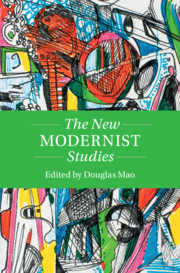Book contents
- The New Modernist Studies
- Twenty-First-Century Critical Revisions
- The New Modernist Studies
- Copyright page
- Dedication
- Contents
- Figures
- Notes on Contributors
- Acknowledgments
- Introduction
- I Histories
- II Horizons
- Chapter 3 Planetarity’s Edges
- Chapter 4 Religion’s Configurations
- Chapter 5 Disability’s Disruptions
- Chapter 6 Affect’s Vocabularies
- Chapter 7 Invisibility’s Arts
- Chapter 8 Black Writing’s Visuals
- Chapter 9 Noir Film’s Soundtracks
- Chapter 10 Language’s Hopes
- Chapter 11 Revolution’s Demands
- Chapter 12 Feminism’s Archives
- Chapter 13 Risk’s Instruments
- Chapter 14 Deep Time’s Hauntings
- Bibliography
- Index
Chapter 3 - Planetarity’s Edges
Modernist Studies and the Bounds of Modernism
from II - Horizons
Published online by Cambridge University Press: 21 January 2021
- The New Modernist Studies
- Twenty-First-Century Critical Revisions
- The New Modernist Studies
- Copyright page
- Dedication
- Contents
- Figures
- Notes on Contributors
- Acknowledgments
- Introduction
- I Histories
- II Horizons
- Chapter 3 Planetarity’s Edges
- Chapter 4 Religion’s Configurations
- Chapter 5 Disability’s Disruptions
- Chapter 6 Affect’s Vocabularies
- Chapter 7 Invisibility’s Arts
- Chapter 8 Black Writing’s Visuals
- Chapter 9 Noir Film’s Soundtracks
- Chapter 10 Language’s Hopes
- Chapter 11 Revolution’s Demands
- Chapter 12 Feminism’s Archives
- Chapter 13 Risk’s Instruments
- Chapter 14 Deep Time’s Hauntings
- Bibliography
- Index
Summary
This chapter asks whether the “planetary,” a term that has gained currency in literary criticism since the 1990s, is a manageable framework through which to study modernism. Current iterations of the “planetary” signal crises in our contemporary shared human environment, while also marking a transformation in our disciplines. Addressing this bind, Blanco considers a number of different uses and versions of “planetarity,” from Gayatri Spivak’s and Enrique Dussel’s to Susan Stanford Friedman’s recent provocations within the new modernist studies. While thinking about the advantages and disadvantages of framing a center-less modernism, Blanco also asks what happens when rupture is not thought of as the principal operating principle through which to think modernism. Framing these questions around the experiences of Spanish American modernistas in fin-de-siècle Paris (especially Nicaraguan Rubén Darío and Guatemalan Enrique Gómez Carrillo), Blanco ask whether a privileging of a planetary framework effectively undoes a workable conceptualization of modernism.
Keywords
- Type
- Chapter
- Information
- The New Modernist Studies , pp. 67 - 87Publisher: Cambridge University PressPrint publication year: 2021
- 1
- Cited by



